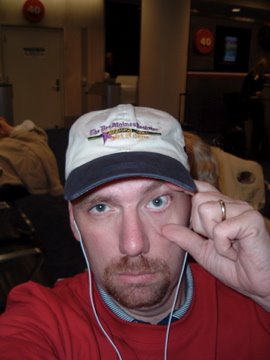The Best (and Worst) of the Times
The war of words continues over whether the NYT should earn more Pulitzers for telling the public about the chicanery of the Bushies or be shut down for treason.
Adam Platt in the Minneapolis Star-Tribune says the paper of record is such a blessing that we should stop reading it online and start paying for it. "Right now, more than any other nongovernmental entity (and most governmental ones, where whistle-blowers are punished, scientists are muzzled and the public is regularly lied to), the NYT protects America's freedom," he writes.
Over on the right at the National Review, Jonah Goldberg hews to the conservative line that the Times has stepped over the line in reporting that the Bushies are monitoring bank transactions to keep tabs on the terrorists:
At the Washington Post, David Ignatius tries to steer a middle course by conceding that the Times' reporting, while accurate and protected by the Constitution, might also carry with it a cost in the War on Terror: "The damage of disclosure isn't just that it will tip off the terrorists, but that it will embarrass or otherwise jeopardize those helping to stop the terrorists, be they foreign governments or private companies."
Hugo Black said it best 35 years ago when the Times was also under fire for supposedly undoing national security, that time by publishing the Pentagon Papers. It deserves a reprint here:
Substitute "Iraq" for the word "Vietnam", and you get a pretty good idea at what's at stake. Rest easy, Justice Black. Here's the hoping the Constitution prevails.
Adam Platt in the Minneapolis Star-Tribune says the paper of record is such a blessing that we should stop reading it online and start paying for it. "Right now, more than any other nongovernmental entity (and most governmental ones, where whistle-blowers are punished, scientists are muzzled and the public is regularly lied to), the NYT protects America's freedom," he writes.
Over on the right at the National Review, Jonah Goldberg hews to the conservative line that the Times has stepped over the line in reporting that the Bushies are monitoring bank transactions to keep tabs on the terrorists:
What infuriates me is how anybody who raises these criticisms is caught in a Catch-22. ... The media gets to reveal anything it wants for any reason it sees fit in the name of “the people’s right to know.” But when the people, in their common sense, object to the disclosure of secret programs they expected their government to be conducting all along, the cognoscenti immediately ridicule the people for their ignorance. And when politicians or pundits echo the same concerns, the press immediately circles the wagons, declaring in its coverage and commentary that any such criticism is out of bounds, even un-American. It seems that for many of these people, free speech is a lot like government secrecy. Both are only legitimate when the New York Times says so.
At the Washington Post, David Ignatius tries to steer a middle course by conceding that the Times' reporting, while accurate and protected by the Constitution, might also carry with it a cost in the War on Terror: "The damage of disclosure isn't just that it will tip off the terrorists, but that it will embarrass or otherwise jeopardize those helping to stop the terrorists, be they foreign governments or private companies."
Hugo Black said it best 35 years ago when the Times was also under fire for supposedly undoing national security, that time by publishing the Pentagon Papers. It deserves a reprint here:
In the First Amendment, the Founding Fathers gave the free press the protection it must have to fulfill its essential role in our democracy. The press was to serve the governed, not the governors. The Government's power to censor the press was abolished so that the press would remain forever free to censure the Government. The press was protected so that it could bare the secrets of government and inform the people. Only a free and unrestrained press can effectively expose deception in government. And paramount among the responsibilities of a free press is the duty to prevent any part of the government from deceiving the people and sending them off to distant lands to die of foreign fevers and foreign shot and shell. In my view, far from deserving condemnation for their courageous reporting, the New York Times, the Washington Post, and other newspapers should be commended for serving the purpose that the Founding Fathers saw so clearly. In revealing the workings of government that led to the Vietnam war, the newspapers nobly did precisely that which the Founders hoped and trusted they would do.
Substitute "Iraq" for the word "Vietnam", and you get a pretty good idea at what's at stake. Rest easy, Justice Black. Here's the hoping the Constitution prevails.


0 Comments:
Post a Comment
<< Home